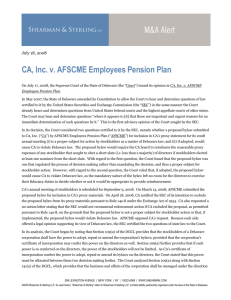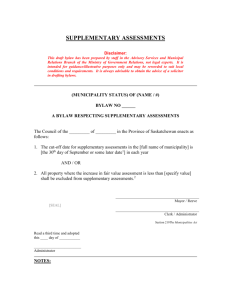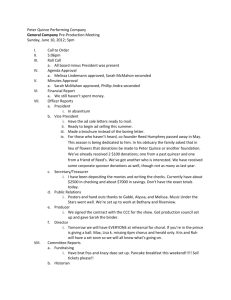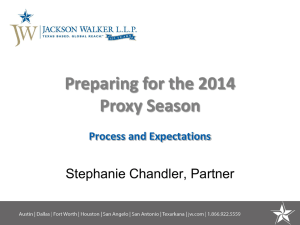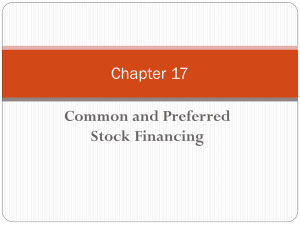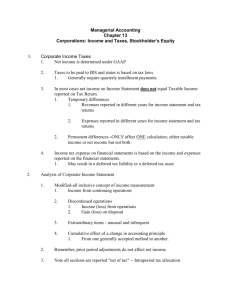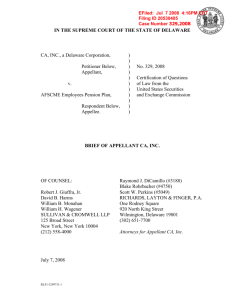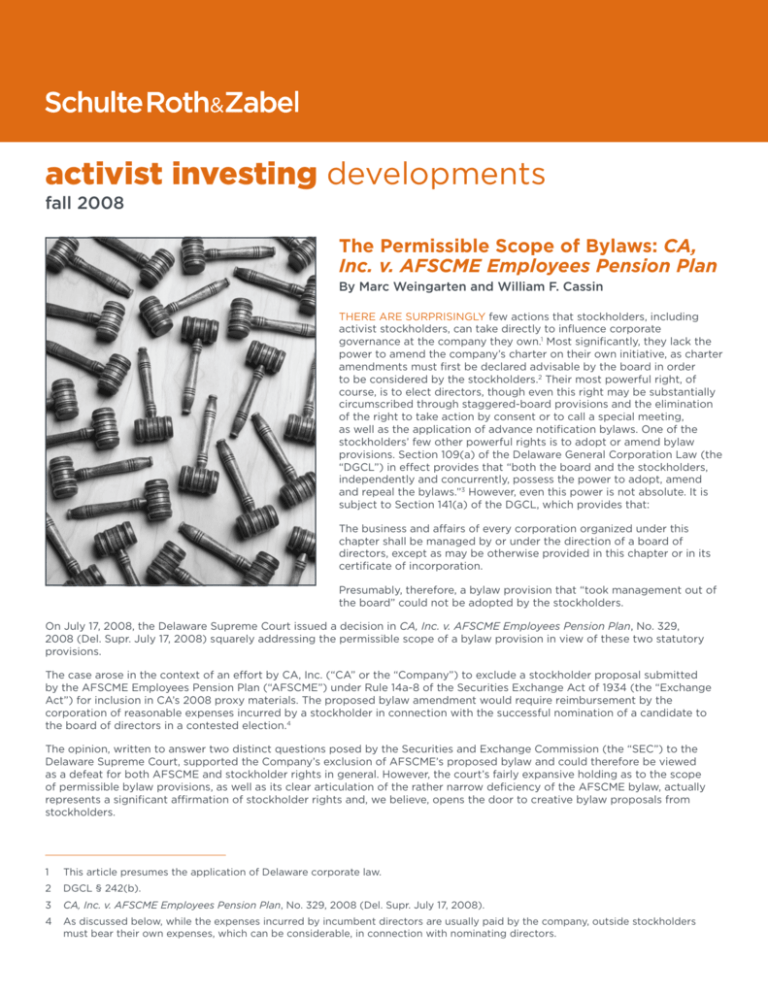
activist investing developments
fall 2008
The Permissible Scope of Bylaws: CA,
Inc. v. AFSCME Employees Pension Plan
By Marc Weingarten and William F. Cassin
THERE ARE SURPRISINGLY few actions that stockholders, including
activist stockholders, can take directly to influence corporate
governance at the company they own.1 Most significantly, they lack the
power to amend the company’s charter on their own initiative, as charter
amendments must first be declared advisable by the board in order
to be considered by the stockholders.2 Their most powerful right, of
course, is to elect directors, though even this right may be substantially
circumscribed through staggered-board provisions and the elimination
of the right to take action by consent or to call a special meeting,
as well as the application of advance notification bylaws. One of the
stockholders’ few other powerful rights is to adopt or amend bylaw
provisions. Section 109(a) of the Delaware General Corporation Law (the
“DGCL”) in effect provides that “both the board and the stockholders,
independently and concurrently, possess the power to adopt, amend
and repeal the bylaws.”3 However, even this power is not absolute. It is
subject to Section 141(a) of the DGCL, which provides that:
The business and affairs of every corporation organized under this
chapter shall be managed by or under the direction of a board of
directors, except as may be otherwise provided in this chapter or in its
certificate of incorporation.
Presumably, therefore, a bylaw provision that “took management out of
the board” could not be adopted by the stockholders.
On July 17, 2008, the Delaware Supreme Court issued a decision in CA, Inc. v. AFSCME Employees Pension Plan, No. 329,
2008 (Del. Supr. July 17, 2008) squarely addressing the permissible scope of a bylaw provision in view of these two statutory
provisions. The case arose in the context of an effort by CA, Inc. (“CA” or the “Company”) to exclude a stockholder proposal submitted
by the AFSCME Employees Pension Plan (“AFSCME”) under Rule 14a-8 of the Securities Exchange Act of 1934 (the “Exchange
Act”) for inclusion in CA’s 2008 proxy materials. The proposed bylaw amendment would require reimbursement by the
corporation of reasonable expenses incurred by a stockholder in connection with the successful nomination of a candidate to
the board of directors in a contested election.4
The opinion, written to answer two distinct questions posed by the Securities and Exchange Commission (the “SEC”) to the
Delaware Supreme Court, supported the Company’s exclusion of AFSCME’s proposed bylaw and could therefore be viewed
as a defeat for both AFSCME and stockholder rights in general. However, the court’s fairly expansive holding as to the scope
of permissible bylaw provisions, as well as its clear articulation of the rather narrow deficiency of the AFSCME bylaw, actually
represents a significant affirmation of stockholder rights and, we believe, opens the door to creative bylaw proposals from
stockholders.
1
This article presumes the application of Delaware corporate law.
2 DGCL § 242(b).
3 CA, Inc. v. AFSCME Employees Pension Plan, No. 329, 2008 (Del. Supr. July 17, 2008).
4 A
s discussed below, while the expenses incurred by incumbent directors are usually paid by the company, outside stockholders
must bear their own expenses, which can be considerable, in connection with nominating directors.
Background to the Decision and the Current Law Regarding
Proxy Solicitation Expense Reimbursement
As noted above, the CA, Inc. case arose out of a proposed
bylaw amendment submitted by AFSCME for inclusion in CA’s
2008 proxy materials pursuant to Rule 14a-8 of the Exchange
Act. This rule provides a stockholder owning a relatively small
amount of a company’s securities with an opportunity to have
its proposal included in a company’s proxy materials alongside
those of management for presentation to a vote at the
annual meeting of stockholders. The rule generally requires
the company to include the proposal unless the stockholder
has not complied with the rule’s procedural requirements
or the proposal falls within one of 13 categories specifically
enumerated in the rule.5 If a company believes a proposal falls
within one of these categories, it may inform the SEC of its
desire to exclude the proposal and request a no-action letter
stating that the SEC will not recommend an enforcement
action against the company based on the proposed exclusion.
The SEC then reviews the request and the proposal and either
issues the requested no-action letter or states that it declines
to do so.6 Companies receiving their requested no-action
letters will typically exclude the proposal from their proxy
materials, while companies failing to receive the letter will
include the stockholder proposal.
AFSCME’s proposed bylaw, if voted on and passed by CA
stockholders, would have required the Company’s board
of directors to reimburse a stockholder or a stockholder
group soliciting proxies in support of a short slate of director
nominees (i.e., a slate of directors comprising less than a
majority of the board) for its reasonable costs incurred in the
solicitation, so long as at least one nominee on the short slate
was successfully elected to the board. As most stockholders
interested in effecting change at the board level are well
aware, the almost universal rule of proxy solicitations is that
expenses incurred by a corporation’s board of directors to
solicit proxies for the election of the company’s nominees are
paid by the corporation; such expenses are viewed much like
the expenses of preparing and distributing the corporation’s
annual report—as just one of the many costs associated with
running a company. The practical result, however, is that
a proxy solicitation conducted by an incumbent board is
essentially free to the incumbent board and to the candidates
nominated by the board—and remains so whether these
candidates win or lose their election. In contrast, a proxy
solicitation conducted by a “dissident” stockholder must be
paid for by the stockholder, and, in general, the stockholder
has no right to reimbursement for the cost of such solicitation,
even if the stockholder’s candidate is elected.7 And if the
stockholder fails to win election for any of its candidates,
there is virtually no chance of reimbursement.
The economic burden placed on stockholders undertaking
a proxy solicitation operates as a significant disincentive to
stockholders contemplating seeking board representation,
and clearly favors incumbent boards. AFSCME’s proposed
bylaw, by mandating reimbursement to successful candidates,
would have mitigated the financial disincentive faced by
stockholders to some extent, arguably leveling the playing
field somewhat between incumbents and dissident slates.
CA’s Grounds for Exclusion and the Questions Posed to the
Delaware Supreme Court
In its request for a no-action letter, CA sought to exclude the
AFSCME proposal from its proxy materials on two principal
Schulte Roth & Zabel LLP
grounds:8 (i) the AFSCME proposal was not a proper subject
for action by stockholders of a Delaware corporation, and
(ii) AFSCME’s proposed bylaw, if adopted, would cause CA
to violate Delaware law. Not surprisingly, AFSCME disagreed
with CA’s view. Both AFSCME and CA’s Delaware counsel
submitted opinions to the SEC supporting their respective
positions, and in the face of these conflicting legal opinions,
the SEC formally certified these issues to the Delaware
Supreme Court for guidance.
Is the Question of Proxy-Expense Reimbursement a Proper
Subject for Stockholder Action?
The Delaware Supreme Court first addressed the question
of whether the AFSCME proposal was a proper subject
for stockholder action. The court discussed the interplay
between Sections 109(a) and 141(a), and concluded that
while stockholders are entitled to adopt bylaws, their power
to do so is not “coextensive” with that of the board of
directors, but is limited by the board’s prerogatives under
Section 141(a). In other words, there are areas of corporate
power that exclusively pertain to the board, and stockholders
are prohibited from infringing on board power in these
areas. However, the court rejected CA’s argument that any
bylaw that infringes on the power of the board of directors
automatically falls outside of the scope of permissible bylaws.
The court then turned to the two central questions of the case:
Where is the line between permissible stockholder action
and improper intrusion on the board’s power to manage the
corporation, and on which side of this line does the question
of proxy solicitation expense reimbursement, as embodied by
AFSCME’s proposed bylaw, fall? While it explicitly declined
to provide a bright line answer to the first question, the court
stated that “[i]t is well established Delaware law that a proper
function of bylaws is not to mandate how the board should
decide specific substantive decisions but rather to define
the processes and procedures by which those decisions are
made.” Having determined that the proper focus of its inquiry
is whether the AFSCME bylaw was process-related, the court
analyzed the proposed bylaw and concluded that while it calls
5 T
he categories include, among others, (i) if the proposal is
not a proper subject for stockholder action under the laws of
the jurisdiction in which the company is incorporated; (ii) if
the proposal would cause the company to violate any state,
federal or foreign law to which it is subject; (iii) if the proposal
relates to a personal grievance against the company; and (iv)
if the proposal deals with a matter relating to the company’s
ordinary business operations.
6 D
uring the 2006–07 proxy season, the SEC responded to
approximately 360 Rule 14a-8 no-action requests, according to
the SEC.
7 W
hile a newly elected member or members of a board are
free to request reimbursement for the expenses incurred by
the stockholder responsible for his or her election, under the
law of most jurisdictions, including Delaware, the majority is
equally free to reject the request. If a stockholder successfully
nominates and elects a majority of the board of directors, the
stockholder may be able to recoup its expenses, assuming
such reimbursement is approved by the new majority of the
board, but reimbursement may also be subject to approval by
stockholders.
8 A
s noted above, both of the grounds cited by CA are among
those listed in Rule 14a-8 as permissible grounds for excluding
a stockholder proposal.
activist investing developments — fall 2008 | 2
for an expenditure of money, it nevertheless “has the intent
and effect of regulating the process for electing directors”
and, accordingly, that it is a proper subject for stockholder
action. Would the AFSCME Bylaw Proposal Cause CA to Violate
Delaware Law?
The Delaware Supreme Court then turned to the second
question posed to it by the SEC: whether AFSCME’s proposed
bylaw, if adopted, would cause CA to violate Delaware law.
The court held that it would. In reaching its conclusion,
the court focused on the mandatory nature of AFSCME’s
proposed bylaw, which would require reimbursement of
election expenses incurred by outside stockholders in all
instances of a successful election. Because it mandated
reimbursement in all cases, the court reasoned, there could
be situations in which compliance with AFSCME’s proposed
bylaw would cause a board to breach its fiduciary duties.
Reimbursement could be improper, reasoned the court, in
situations where the proxy contest for which reimbursement
was sought was “motivated by personal or petty concerns,
or to promote interests that do not further, or are adverse to,
those of the corporation.” As a result, the AFSCME-proposed
bylaw would violate the well-established prohibition against
contractual arrangements that preclude a board from fully
discharging its fiduciary duties. For these reasons, the court
held that the bylaw, if enacted by stockholders, would violate
Delaware law, thereby providing the grounds on which CA
could permissibly exclude it from its 2008 proxy materials.
Implications of the CA Decision
From a stockholder-rights perspective, the CA decision has a
number of positive implications.
The Delaware Supreme Court reaffirmed the principle
that a bylaw should not mandate the board’s substantive
business decisions, but rather should define the process and
procedures by which these decisions are made. However,
the court also held that “whether or not a bylaw is process
related must necessarily be determined in light of its
context and purpose.” The court found that the context of
the AFSCME proposed bylaw was the process for electing
directors and, accordingly, that even though the bylaw
mandated reimbursement by the board with the expenditure
of corporate funds, it was nevertheless a proper subject
for stockholder action. Thus, a bylaw provision need not
specify process exclusively; it simply must contextually relate
to process. This holding opens the door to a wide array of
potential bylaw provisions to be adopted at the initiative of
stockholders.
While holding that the CA bylaw would have violated
Delaware law, the state’s high court specified the cure for its
infirmity: the inclusion of a “fiduciary out.” As indicated above,
the court gave examples where the grant of reimbursement
could violate fiduciary duties, such as where the dissident
was motivated by personal or petty concerns, or sought to
promote interests that did not further, or were adverse to,
those of the corporation. While the latter seems somewhat
expansive, the accompanying footnote indicates that such a
circumstance may arise where a stockholder group affiliated
with a competitor sought to elect candidates “committed” to
using their director position to pass proprietary information
to the competitor. Narrow grounds indeed, that would seem
to disqualify not a single proxy contest within memory. And
the court warned that, of course, “[a] decision by directors to
deny reimbursement on fiduciary grounds would be judicially
reviewable.” While incumbent board members might well
argue against a reimbursement request submitted by a newly
elected dissident board member on the grounds that the
dissident’s agenda did not further the corporation’s interests,
the success of such an argument seems highly unlikely in view
of the majority stockholder approval implicit in the election of
the dissident to the board.
The aspect of the court’s holding that defines the permissible
scope of a bylaw may also be used by activist stockholders as
a sword as well as a shield. It is not beyond boards to adopt
bylaws seeking to restrict stockholder rights or powers, and
the language of this decision should provide courts with the
necessary ammunition to invalidate such provisions, even
though board-approved.
The court noted in this decision that it has, in the past, upheld
a bylaw requiring that board decisions be unanimous in order
to be effective. A bylaw of this nature would be extremely
powerful to an activist when coupled with the election of a
minority slate, or even one director. The court also noted that
it has, in the past, upheld the power of stockholders to abolish
board-created committees. This raises some interesting
questions. Could stockholders mandate the creation of a
board committee? Possibly more significantly, could they
identify which members of the board were to sit on the newly
created committee?
The court declined to adopt a bright-line test dividing
bylaws into those that stockholders may unilaterally adopt
and those that they may not. This lack of predictability
will, unfortunately, mean more litigation, with boards again
utilizing the corporate treasury to fight dissidents who must
finance their cause out of their own pockets. This very lack of
predictability, however, also opens the door to stockholders
willing to craft, with a view to the court’s guidance, bylaw
proposals that will withstand challenge. More case law
undoubtedly will be forthcoming. g
The information in this newsletter has been prepared by Schulte Roth & Zabel LLP (“SRZ”) for general informational purposes only. It does not constitute
legal advice, and is presented without any representation or warranty whatsoever as to the accuracy or completeness of the information or whether it
reflects the most current legal developments. Distribution of this information is not intended to create, and its receipt does not constitute, an attorneyclient relationship between SRZ and you or anyone else. Electronic mail or other communications to SRZ (or any of its attorneys, staff, employees, agents
or representatives) resulting from your receipt of this information cannot be guaranteed to be confidential and will not, and should not be construed to,
create an attorney-client relationship between SRZ and you or anyone else. No one should, or is entitled to, rely in any manner on any of this information.
Parties seeking advice should consult with legal counsel familiar with their particular circumstances. Under the rules or regulations of some jurisdictions,
this material may constitute advertising.
Copyright © 2008 Schulte Roth & Zabel LLP. All Rights Reserved.
® is the registered trademark of Schulte Roth & Zabel LLP.
Schulte Roth & Zabel LLP
activist investing developments — fall 2008 | 3

